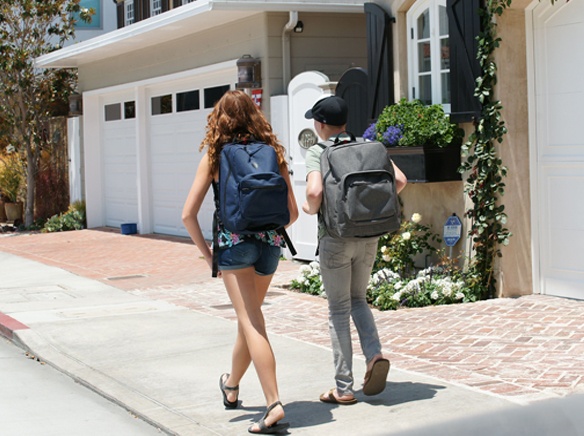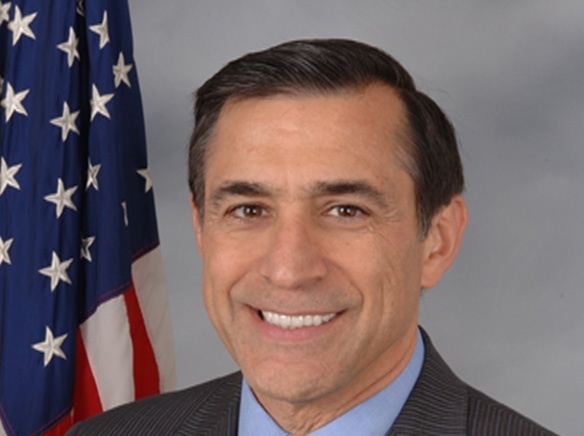
As the timer starts two 14-year-old and 11-year-old sisters race to disassemble their backpacks containing two bulletproof plates into vests.
After an hour of practice they get it down to 13 seconds.
“Speed is everything,” 45-year-old Tom Leyland, who asked that his daughters not be identified because of safety concerns, said.
About a year and a half ago Leyland decided to purchase his daughters Leatherback Gear bulletproof backpacks, which retail for around $365 and convert into vests with a drag handle. The decision happened over time as he witnessed different current events in the news, he said.
“The last thing any parent wants to do is even think about something like that happening … but at the same time you feel like you’re empowering them,” Leyland said. “You’re giving them a fighting chance.”
The backpacks are tested using different firearms at close and far ranges, public relations contact for Leatherback Gear Sarah Zeiler said.
The company was started in 2016 by two brothers in law enforcement who have experienced multiple active shootings and felt the need to expand personal protection to everyday civilians, Zeiler said.
Other parents in the Alpine area have also decided to add bulletproof backpacks and plates to their back-to-school lists in the wake of mass shootings around the country.
There have been 288 confirmed and reported mass shootings in the U.S. so far this year, according to Gun Violence Archive (GVA), a nonprofit that tracks gun-related violence using media, law enforcement, and government sources. A mass shooting is defined by GVA as an incident where four or more people, not including the shooter, are shot or killed. From these mass shootings has come an increased demand for bulletproof backpacks and plates, with major retailers like Home Depot and Bed Bath and Beyond offering them online.
After a shooting Zeiler said sales can increase dramatically, sometimes by 400 to 500 percent.
When 40-year-old Farrah Lennon’s husband discovered bulletproof backpacks online, they decided it would be an added protection for their 19-year-old daughter at Grossmont College.
Lennon and her husband also talked about drills and showed their daughter what gunshots sound like on YouTube in case of a shooting at her school, Lennon said.
“I think that every parent should do everything they can to protect their kids,” Lennon said. “If there are these things out there that can protect our kids, then it’s worth it.”
Although Lennon said it was not fear that drove her to buy the bulletproof backpack for her daughter, she did have a close call with a mass shooting in 2001.
Lennon attended Granite Hills High School and was visiting the school with her baby the day before a student opened fire on March 22, wounding two teachers and three students.
She said she was proud of the way the school handled the shooting, which had a school resource officer present on campus who apprehended the shooter.
The best thing for schools to do is to have an action plan in place, like fire drills, to be prepared in case a shooting happens, Lennon said.
Similarly, Leyland, who worked in the U.S. Department of Defense, believes that schools should take preliminary action in case of a shooting.
He said schools should put surveillance systems in place, infrastructure should be repaired for holes or loose boards in fences and staff should be trained to keep their eyes open for anything out of the ordinary. He said he also believes all teachers should be trained to use firearms.
As a gun owner Leyland is also an advocate for personal safety and believes all parents should purchase a bulletproof backpack if they are able to afford it, he said.
“At the end of the day it’s every parent’s responsibility to provide protection to their child,” Leyland said. “You’ve got to be your child’s best advocate.”
Sometimes, instead of parents, its grandparents who decide to take precautionary action against gun violence.
About seven years ago 59-year-old Robin Clegg decided to buy her two grandchildren bulletproof plates for their backpacks before a trip to Hawaii with another grandma. At the time, there had been shootings in airports and schools in the U.S. and other countries, Clegg said.
Clegg’s grandchildren were in elementary school when they received the bulletproof plates, which Clegg said retailed for around $100, and at the ages of 12 and 14 still carry them in their backpacks to school. Being so young at the time, Clegg said her grandchildren did not react to the plates but understood what they were for and how to utilize them.
Not only did Clegg talk to her grandchildren about what the plates were for, but acted out with them what to do if they were ever in a shooter situation. Despite the distressing possibility they represent, Clegg said her grandchildren have never expressed anxiety over the bulletproof plates.
Clegg said she believes that not only should schools spend more of their budget on security, but that there should also be more resources for mental health nationally and a public database of gun owners.
“I think you obviously have to be mentally unstable if you go and shoot people,” Clegg said. “They go hand in hand period.”
Although Leyland’s daughters are aware of recent shootings and current events, he said he had to try and position the backpacks in a way that would not scare them.
As a way to make up for carrying around the grey backpacks, Leyland said his daughters were able to design and paint their backpacks to make them uniquely their own.
He also said that his daughters leave their backpacks by their feet under their desk in class, despite a rule at their school that students have to hang their backpacks on a rack outside.
“You almost have to be very secretive and quiet that you have these backpacks,” Leyland said. “If something were to happen these backpacks become very sacred.”
The backpacks Leyland said are meant to stop a 45-magnum at 10 feet away and are rated level IIIA protection by the National Institute of Justice, an agency in the U.S. Department of Justice. However, with something more powerful, like an assault rifle, they could be less effective, he said.
“The idea behind it was I can’t be there all the time to protect them,” Leyland said. “Any self-respecting parent is going to want to take a bullet for their kid.”













